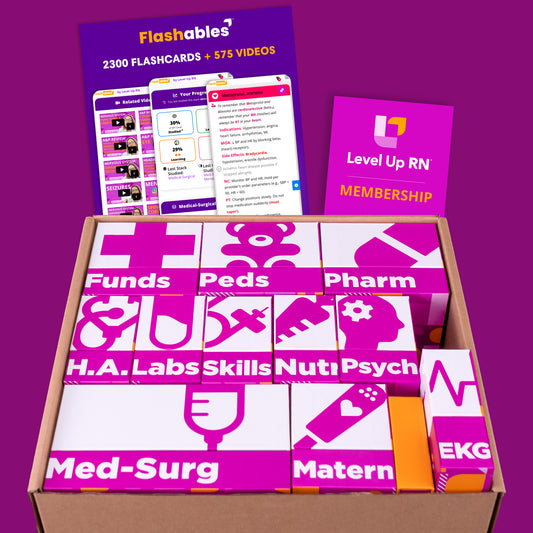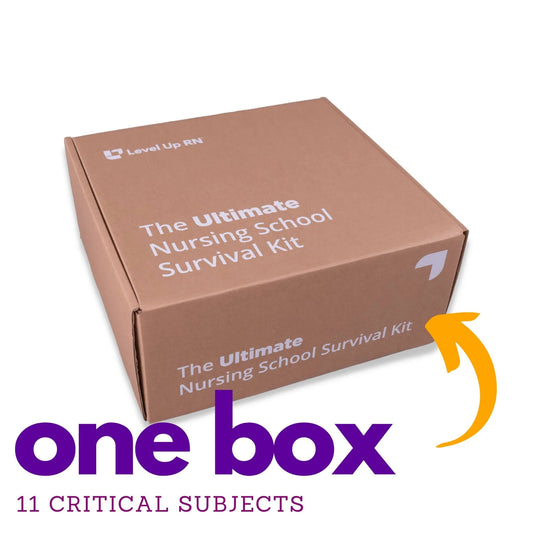Nursing Tips
Fundamentals (119)

Epidemic
An epidemic describes an increase in the number of cases of a disease above what is normally expected in a population or area.
Epidemic
An epidemic describes an increase in the number of cases of a disease above what is normally expected in a population or area.

Disaster Preparedness
Disaster preparedness involves planning, training, and providing education for unavoidable disasters.
Disaster Preparedness
Disaster preparedness involves planning, training, and providing education for unavoidable disasters.
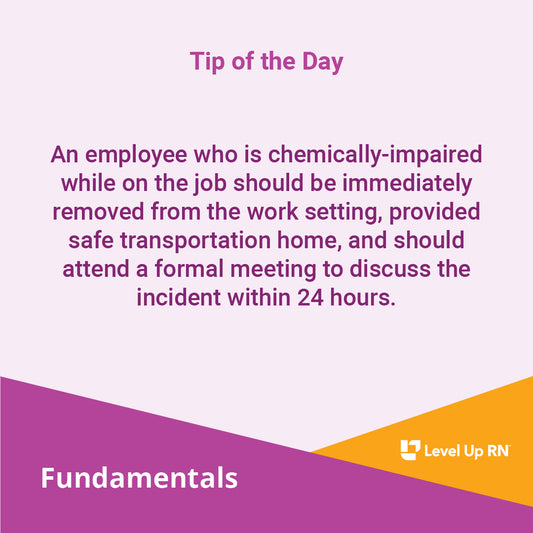
Chemically-impaired Employee
An employee who is chemically-impaired while on the job should be immediately removed from the work setting, provided safe transportation home, and should attend a formal meeting to discuss the...
Chemically-impaired Employee
An employee who is chemically-impaired while on the job should be immediately removed from the work setting, provided safe transportation home, and should attend a formal meeting to discuss the...

Determinants of Health
Determinants of health include environmental factors (e.g., access to healthy food, pollution, public safety) and social factors (e.g., racism, support systems, education).
Determinants of Health
Determinants of health include environmental factors (e.g., access to healthy food, pollution, public safety) and social factors (e.g., racism, support systems, education).
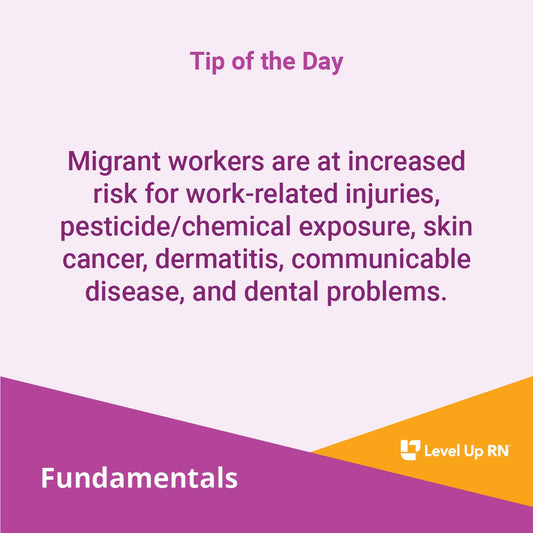
Migrant Workers: Increased Risks
Migrant workers are at increased risk for work-related injuries, pesticide/chemical exposure, skin cancer, dermatitis, communicable disease, and dental problems.
Migrant Workers: Increased Risks
Migrant workers are at increased risk for work-related injuries, pesticide/chemical exposure, skin cancer, dermatitis, communicable disease, and dental problems.
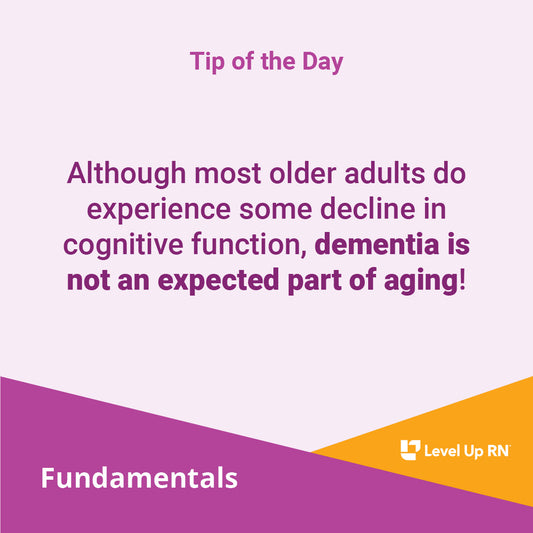
Dementia
Although most older adults do experience some decline in cognitive function, dementia is not an expected part of aging!
Dementia
Although most older adults do experience some decline in cognitive function, dementia is not an expected part of aging!
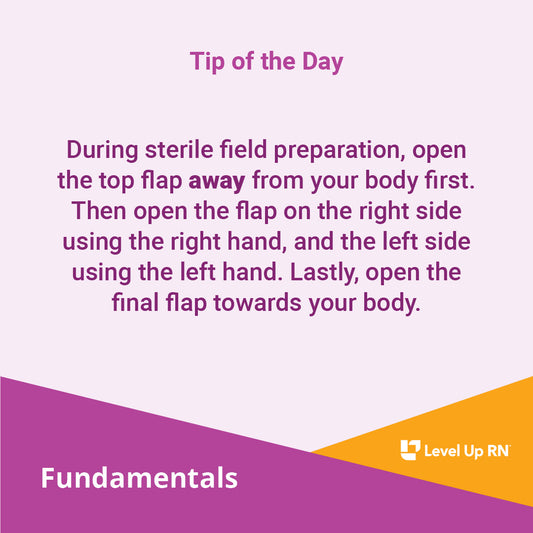
Sterile Field Preparation
During sterile field preparation, open the top flap away from your body first. Then open the flap on the right side using the right hand, and the left side using...
Sterile Field Preparation
During sterile field preparation, open the top flap away from your body first. Then open the flap on the right side using the right hand, and the left side using...
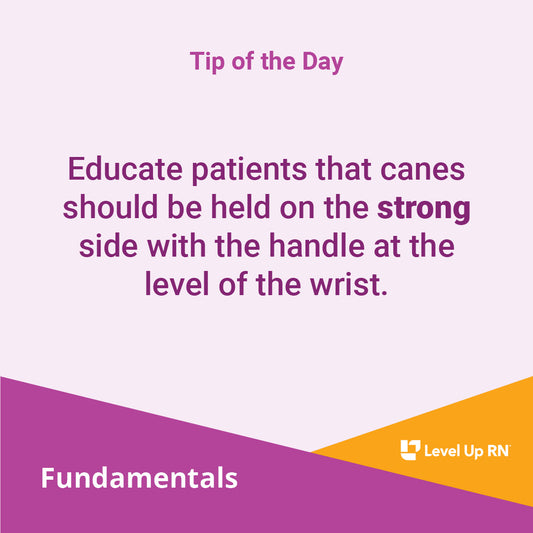
Canes: Patient Teaching
Educate patients that canes should be held on the strong side with the handle at the level of the wrist.
Canes: Patient Teaching
Educate patients that canes should be held on the strong side with the handle at the level of the wrist.
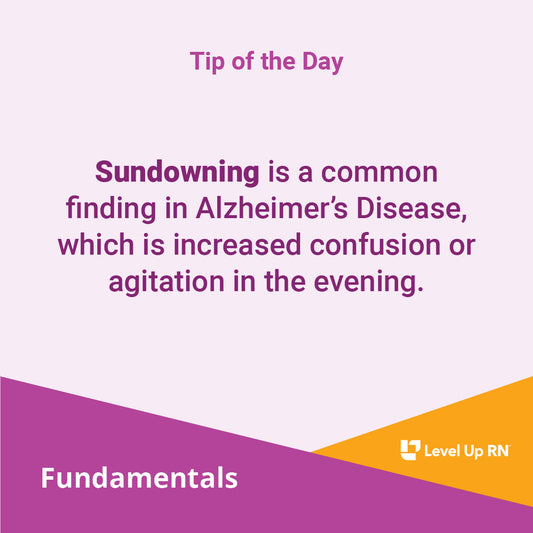
Sundowning
Sundowning is a common finding in Alzheimer's Disease, which is increased confusion or agitation in the evening.
Sundowning
Sundowning is a common finding in Alzheimer's Disease, which is increased confusion or agitation in the evening.

Closed Drain: Nursing Care
After emptying a closed drain (e.g., Jackson-Pratt, Hemovac), fully compress the canister and replace cap in order to ensure negative pressure is applied to the area.
Closed Drain: Nursing Care
After emptying a closed drain (e.g., Jackson-Pratt, Hemovac), fully compress the canister and replace cap in order to ensure negative pressure is applied to the area.
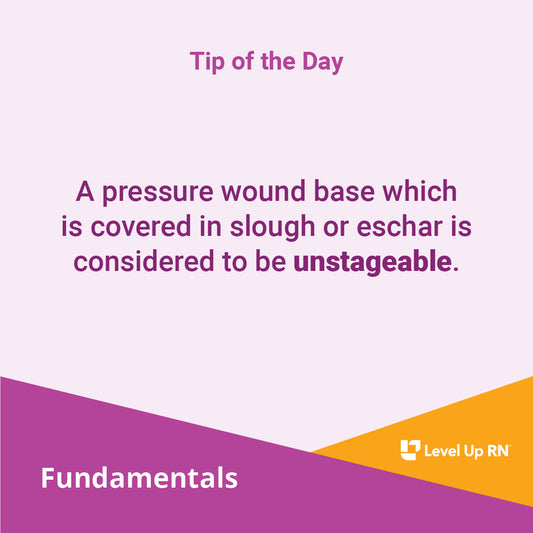
Unstageable Pressure Wound
A pressure wound base which is covered in slough or eschar is considered to be unstageable.
Unstageable Pressure Wound
A pressure wound base which is covered in slough or eschar is considered to be unstageable.

What is an Aggregate?
An aggregate is a subgroup or population that share characteristics or concerns (e.g., LGBT+ residents of the same neighborhood).
What is an Aggregate?
An aggregate is a subgroup or population that share characteristics or concerns (e.g., LGBT+ residents of the same neighborhood).
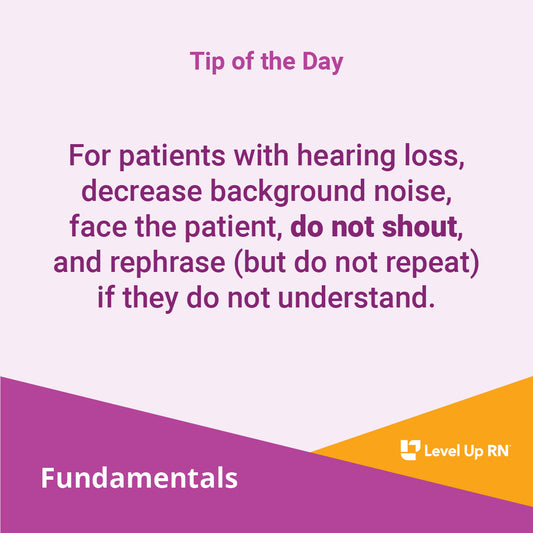
Hearing Loss: Nursing Care
For patients with hearing loss, decrease background noise, face the patient, do not shout, and rephrase (but do not repeat) if they do not understand.
Hearing Loss: Nursing Care
For patients with hearing loss, decrease background noise, face the patient, do not shout, and rephrase (but do not repeat) if they do not understand.

Food Deserts
Food deserts are geographic areas that lack sufficient access to grocery stores and healthy food options.
Food Deserts
Food deserts are geographic areas that lack sufficient access to grocery stores and healthy food options.

Providing Educational Materials to Patients
Written educational materials should be provided in the patient's primary language using layman's terms and an appropriate reading level.
Providing Educational Materials to Patients
Written educational materials should be provided in the patient's primary language using layman's terms and an appropriate reading level.
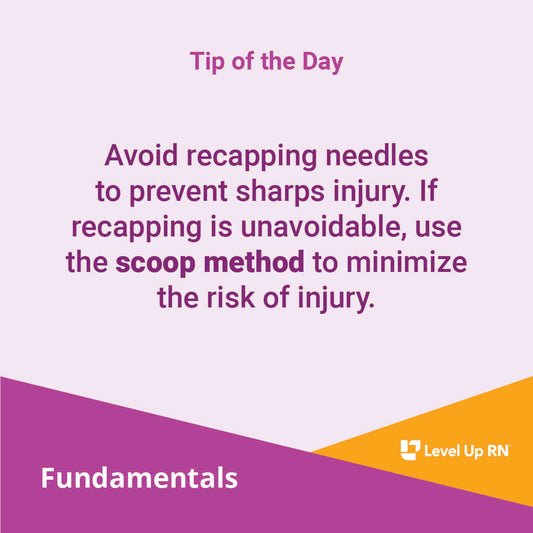
The Scoop Method
Avoid recapping needles to prevent sharps injury. If recapping is unavoidable, use the scoop method to minimize the risk of injury.
The Scoop Method
Avoid recapping needles to prevent sharps injury. If recapping is unavoidable, use the scoop method to minimize the risk of injury.
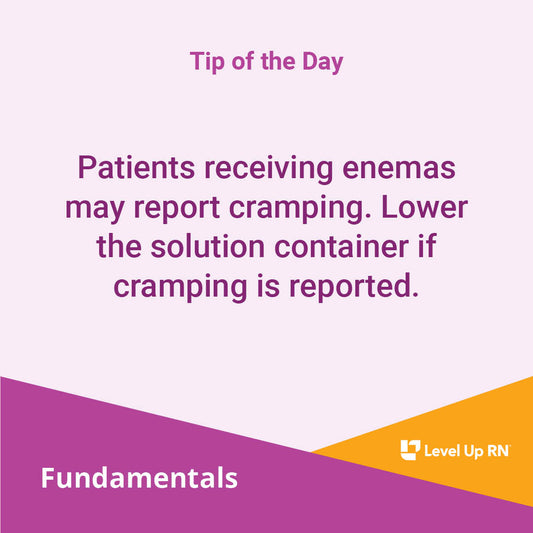
Enemas: Nursing Care
Patients receiving enemas may report cramping. Lower the solution container if cramping is reported.
Enemas: Nursing Care
Patients receiving enemas may report cramping. Lower the solution container if cramping is reported.
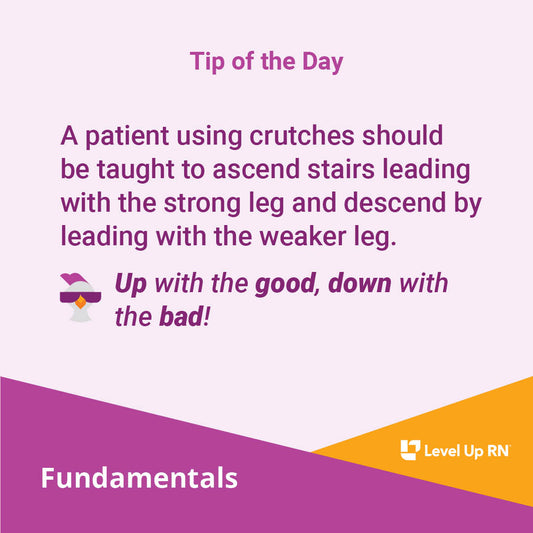
Crutches: Patient Teaching
A patient using crutches should be taught to ascend stairs leading with the strong leg and descend by leading with the weaker leg.
Crutches: Patient Teaching
A patient using crutches should be taught to ascend stairs leading with the strong leg and descend by leading with the weaker leg.
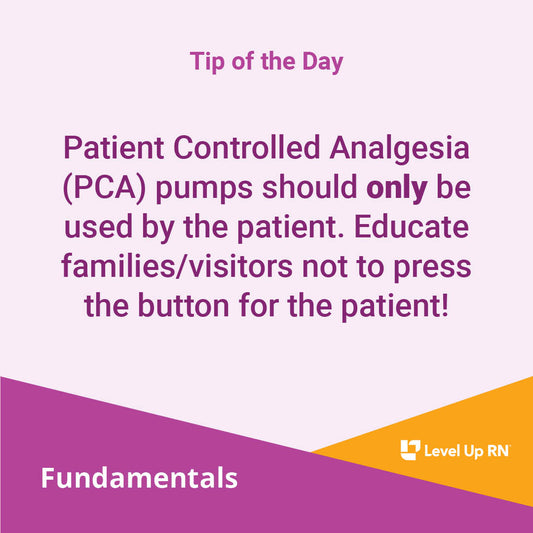
Patient Controlled Analgesia (PCA) Pumps
Patient Controlled Analgesia (PCA) pumps should only be used by the patient. Educate families/visitors not to press the button for the patient!
Patient Controlled Analgesia (PCA) Pumps
Patient Controlled Analgesia (PCA) pumps should only be used by the patient. Educate families/visitors not to press the button for the patient!
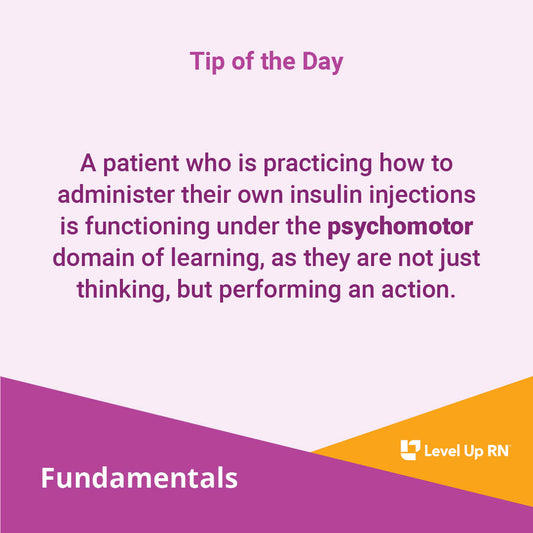
Psychomotor Domain of Learning
A patient who is practicing how to administer their own insulin injections is functioning under the psychomotor domain of learning, as they are not just thinking, but performing an action.
Psychomotor Domain of Learning
A patient who is practicing how to administer their own insulin injections is functioning under the psychomotor domain of learning, as they are not just thinking, but performing an action.
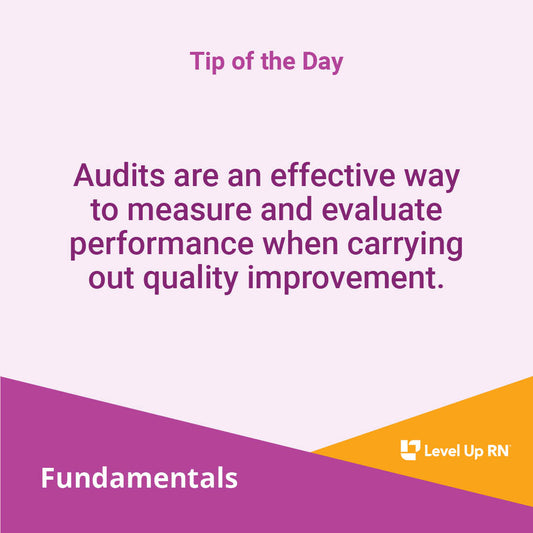
Nursing Audits
Audits are an effective way to measure and evaluate performance when carrying out quality improvement.
Nursing Audits
Audits are an effective way to measure and evaluate performance when carrying out quality improvement.
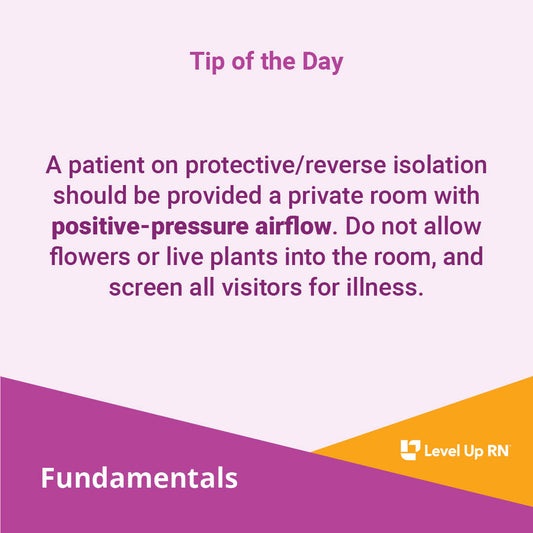
Protective/Reverse Isolation
A patient on protective/reverse isolation should be provided a private room with positive-pressure airflow. Do not allow flowers or live plants into the room, and screen all visitors for illness.
Protective/Reverse Isolation
A patient on protective/reverse isolation should be provided a private room with positive-pressure airflow. Do not allow flowers or live plants into the room, and screen all visitors for illness.
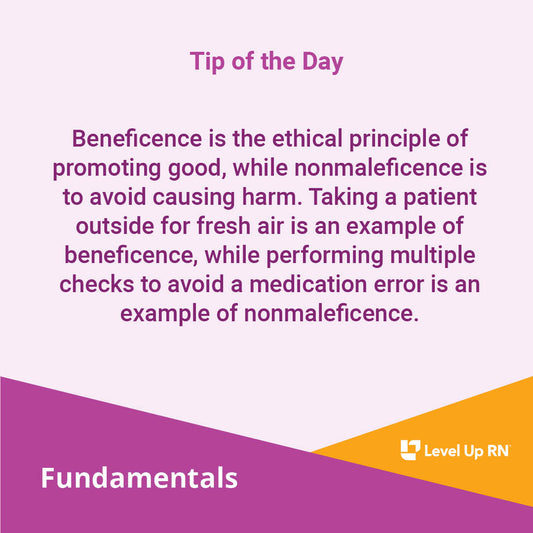
Beneficence vs. Nonmaleficence
Beneficence is the ethical principle of promoting good, while nonmaleficence is to avoid causing harm.
Beneficence vs. Nonmaleficence
Beneficence is the ethical principle of promoting good, while nonmaleficence is to avoid causing harm.
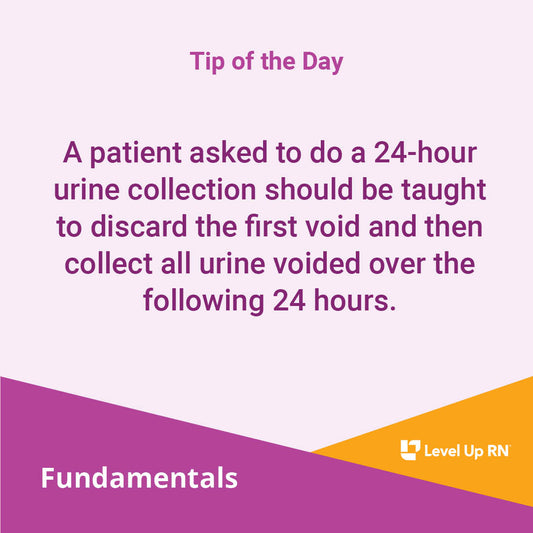
24-Hour Urine Collection
A patient asked to do a 24-hour urine collection should be taught to discard the first void and then collect all urine voided over the following 24 hours.
24-Hour Urine Collection
A patient asked to do a 24-hour urine collection should be taught to discard the first void and then collect all urine voided over the following 24 hours.

Clear Liquid Diets
A patient on a clear liquid diet may have items that are transparent and liquid at room temperature (e.g., water, clear sodas, pulp-free juices, popsicles, jello, black coffee, clear broth).
Clear Liquid Diets
A patient on a clear liquid diet may have items that are transparent and liquid at room temperature (e.g., water, clear sodas, pulp-free juices, popsicles, jello, black coffee, clear broth).
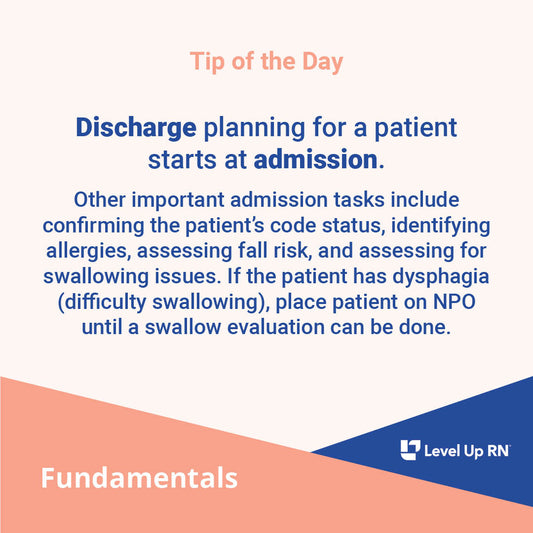
Admission Tasks
Discharge planning for a patient starts at admission. Other important admission tasks include confirming the patient's code status, identifying allergies, assessing fall risk, and assessing for swallowing issues.
Admission Tasks
Discharge planning for a patient starts at admission. Other important admission tasks include confirming the patient's code status, identifying allergies, assessing fall risk, and assessing for swallowing issues.
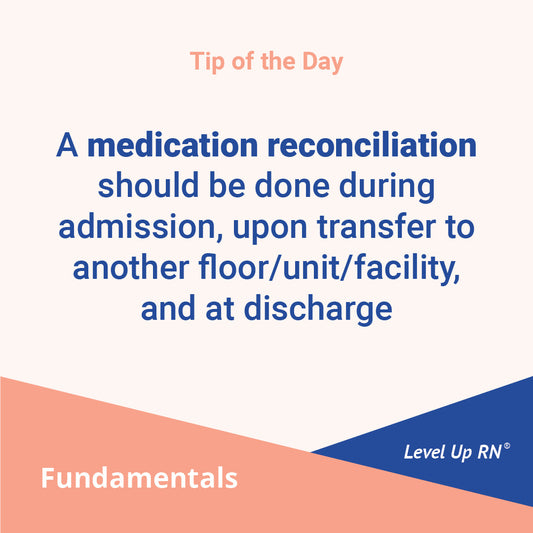
When to Perform a Medication Reconciliation
A medication reconciliation should be done during admission, upon transfer to another floor/unit/facility, and at discharge.
When to Perform a Medication Reconciliation
A medication reconciliation should be done during admission, upon transfer to another floor/unit/facility, and at discharge.
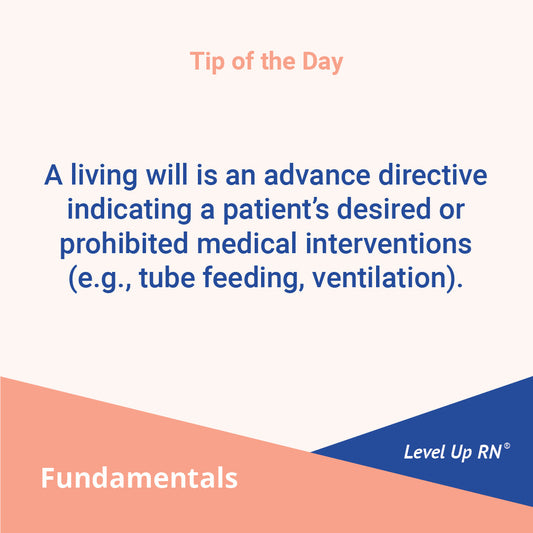
What is a Living Will?
A living will is an advance directive indicating a patient's desired or prohibited medical interventions (e.g., tube feeding, ventilation).
What is a Living Will?
A living will is an advance directive indicating a patient's desired or prohibited medical interventions (e.g., tube feeding, ventilation).
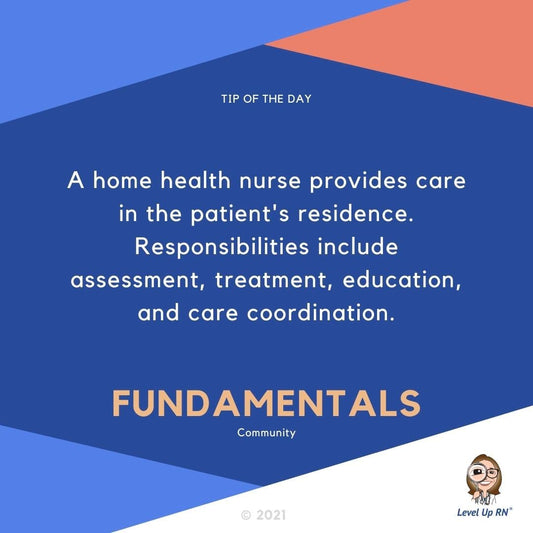
Home Health Nursing Care
A home health nurse provides care in the patient's residence. Responsibilities include assessment, treatment, education, and care coordination.
Home Health Nursing Care
A home health nurse provides care in the patient's residence. Responsibilities include assessment, treatment, education, and care coordination.
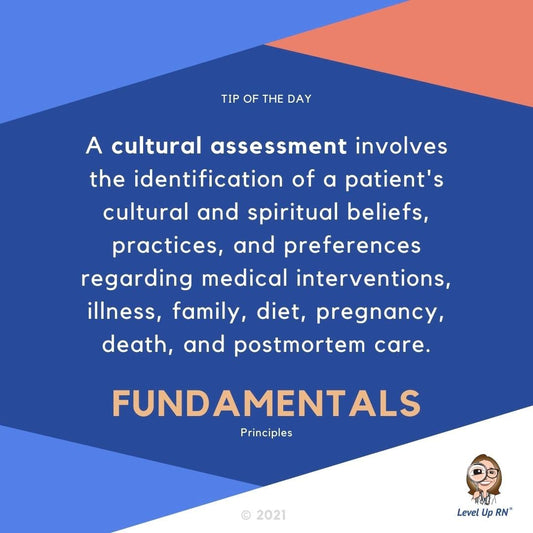
Cultural Assessment
A cultural assessment involves the identification of a patient's cultural and spiritual beliefs, practices, and preferences regarding medical interventions, illness, family, diet, pregnancy, death, and postmortem care.
Cultural Assessment
A cultural assessment involves the identification of a patient's cultural and spiritual beliefs, practices, and preferences regarding medical interventions, illness, family, diet, pregnancy, death, and postmortem care.

High-Fowler's Position
A High-Fowler's position involves the patient sitting with the head of the bed at 60 - 90°. This is the ideal position to help with difficulty breathing.
High-Fowler's Position
A High-Fowler's position involves the patient sitting with the head of the bed at 60 - 90°. This is the ideal position to help with difficulty breathing.
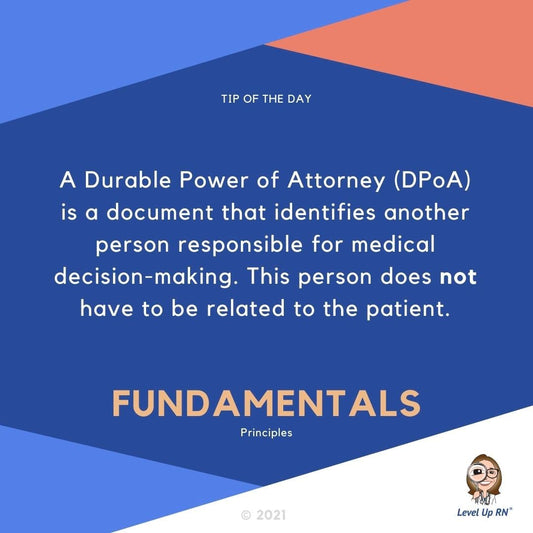
Durable Power of Attorney (DPoA)
A Durable Power of Attorney (DPoA) is a document that identifies another person responsible for medical decision-making. This person does not have to be related to the patient.
Durable Power of Attorney (DPoA)
A Durable Power of Attorney (DPoA) is a document that identifies another person responsible for medical decision-making. This person does not have to be related to the patient.
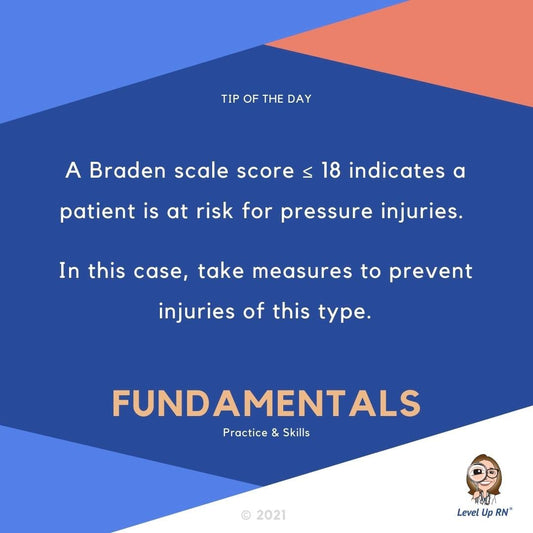
Braden Scale: Pressure Injuries
A Braden scale score ≤ 18 indicates a patient is at risk for pressure injuries. In this case, take measures to prevent injuries of this type.
Braden Scale: Pressure Injuries
A Braden scale score ≤ 18 indicates a patient is at risk for pressure injuries. In this case, take measures to prevent injuries of this type.
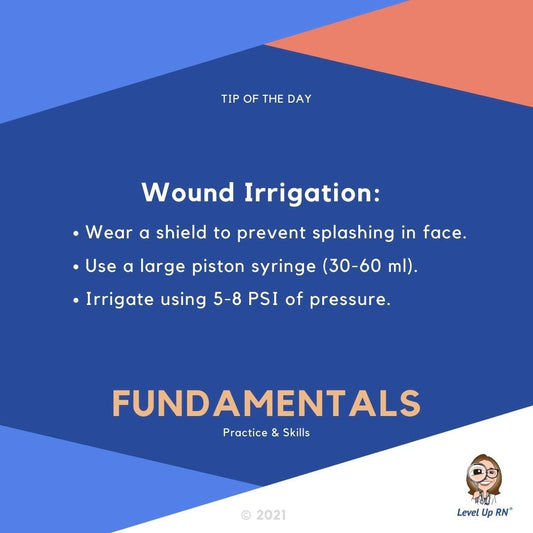

Suctioning
When performing suctioning, apply suction intermittently while withdrawing the catheter and rotating it for 10-15 seconds.
Suctioning
When performing suctioning, apply suction intermittently while withdrawing the catheter and rotating it for 10-15 seconds.
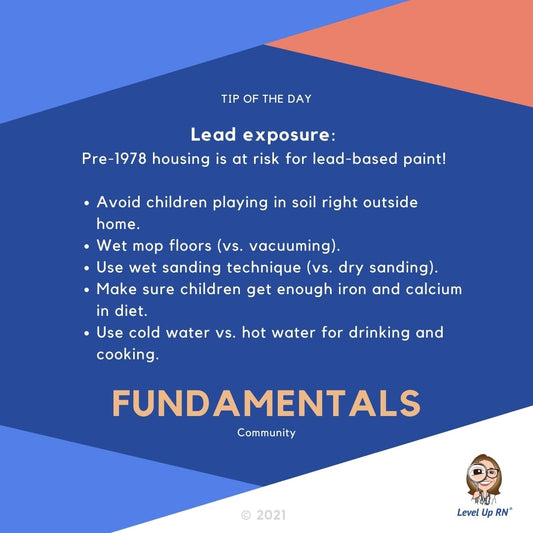
Lead Exposure
Lead exposure: Pre-1978 housing is at risk for lead-based paint! Check out these patient teaching tips.
Lead Exposure
Lead exposure: Pre-1978 housing is at risk for lead-based paint! Check out these patient teaching tips.

Blood Glucose Key Points
Key points when taking a patient's blood glucose: Place hand in dependent position; Pierce outer; Wipe away first drop of blood; Hold test trip NEXT to the blood drop
Blood Glucose Key Points
Key points when taking a patient's blood glucose: Place hand in dependent position; Pierce outer; Wipe away first drop of blood; Hold test trip NEXT to the blood drop

Incidence Vs Prevalence
Incidence vs. Prevalence: Incidence is the number of NEW cases of disease/injury in a population during a period of time. Prevalence is the number of ALL cases (new and pre-existing) of disease/injury...
Incidence Vs Prevalence
Incidence vs. Prevalence: Incidence is the number of NEW cases of disease/injury in a population during a period of time. Prevalence is the number of ALL cases (new and pre-existing) of disease/injury...

Abdominal Wound Dehiscence
For abdominal wound dehiscence with evisceration: Place saline-soaked gauze over wound; Don't try to reinsert organs!; Prepare patient for possible surgery.
Abdominal Wound Dehiscence
For abdominal wound dehiscence with evisceration: Place saline-soaked gauze over wound; Don't try to reinsert organs!; Prepare patient for possible surgery.
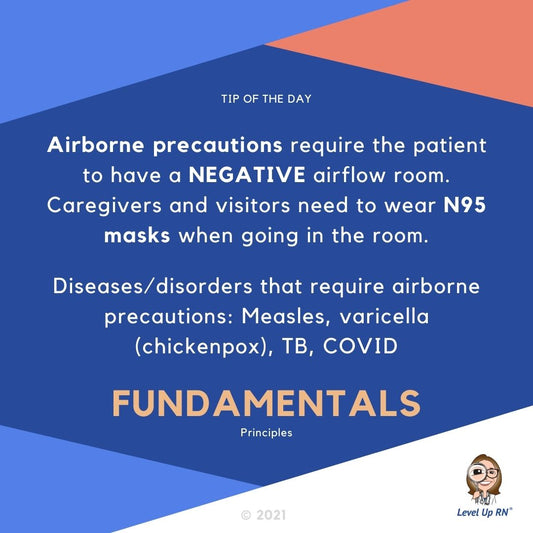
Airborne Precautions
Airborne precautions require the patient to have a NEGATIVE airflow room. Caregivers and visitors need to wear N95 masks when going in the room.
Airborne Precautions
Airborne precautions require the patient to have a NEGATIVE airflow room. Caregivers and visitors need to wear N95 masks when going in the room.

Know your levels of illness prevention!
Know your levels of prevention! Primary, Secondary, Tertiary
Know your levels of illness prevention!
Know your levels of prevention! Primary, Secondary, Tertiary

Applying Restraints
When applying restraints, make sure 2 fingers can fit between restraint and patient, se a quick release knot, and don't place restraints on side rail.
Applying Restraints
When applying restraints, make sure 2 fingers can fit between restraint and patient, se a quick release knot, and don't place restraints on side rail.

Reporting Urine Output
REPORT urine output that is less than 30ml/hr! Decreased urine output can be indicative of shock, sepsis, and kidney failure.
Reporting Urine Output
REPORT urine output that is less than 30ml/hr! Decreased urine output can be indicative of shock, sepsis, and kidney failure.

Maintaining A Sterile Field
Key points about maintaining a sterile field
Maintaining A Sterile Field
Key points about maintaining a sterile field

Enteral Feeding
Enteral feeding: Confirm placement with x-ray; Measure gastric contents; Hold feeding if residual exceeds ~500ml; Flush feeding tubes.
Enteral Feeding
Enteral feeding: Confirm placement with x-ray; Measure gastric contents; Hold feeding if residual exceeds ~500ml; Flush feeding tubes.
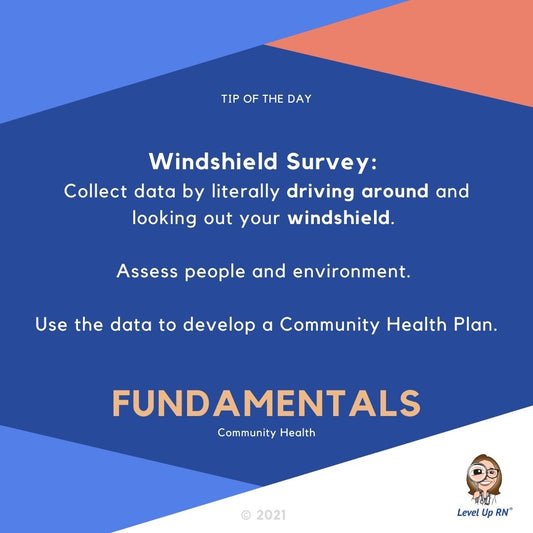
Windshield Survey
Windshield Survey: Collect data by literally driving around and look out your windshield.
Windshield Survey
Windshield Survey: Collect data by literally driving around and look out your windshield.
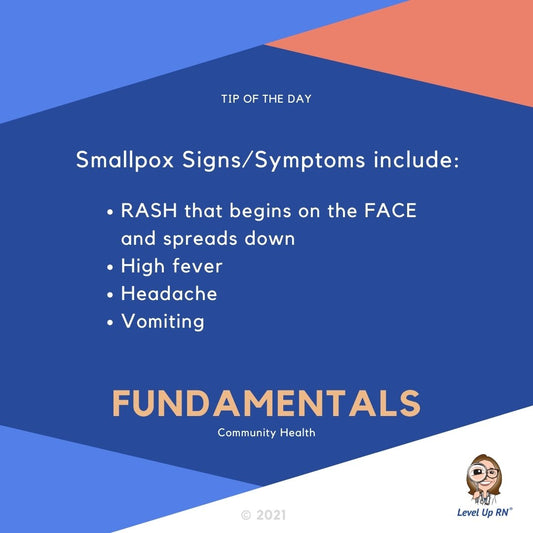
Smallpox Symptoms
Smallpox: Symptoms include a RASH that begins on the FACE and spreads down, high fever, headache, vomiting.
Smallpox Symptoms
Smallpox: Symptoms include a RASH that begins on the FACE and spreads down, high fever, headache, vomiting.
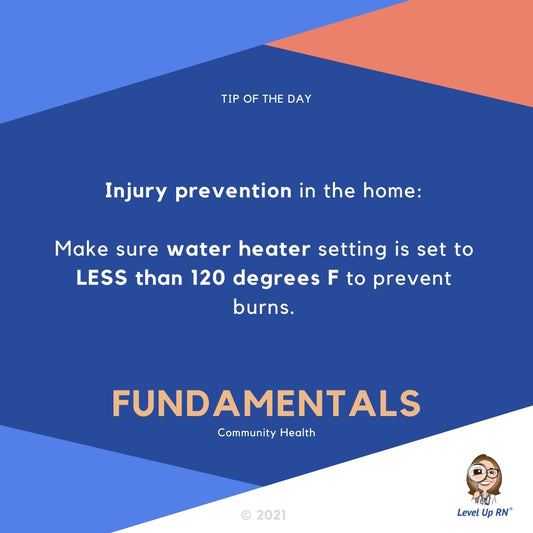
Water Heater Settings
Injury prevention in the home: Make sure water heater setting is set to LESS than 120 degrees F to prevent burns.
Water Heater Settings
Injury prevention in the home: Make sure water heater setting is set to LESS than 120 degrees F to prevent burns.
Filter Articles
Shop
The Ultimate Nursing School Survival Kit - with Flashables and Membership
4.875 / 5.0
(240) 240 total reviews
Regular price $314.96Regular priceUnit price / per$817.95Sale price $314.96SaleVideos by Subject
Tips & More
Exam Information
Subscribe

